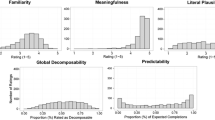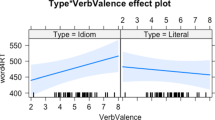Abstract
This study investigates recognition of spoken idioms occurring in neutral contexts. Experiment 1 showed that both predictable and non-predictable idiom meanings are available at string offset. Yet, only predictable idiom meanings are active halfway through a string and remain active after the string’s literal conclusion. Experiment 2 showed that the initial fragment of a predictable idiom inhibits recognition of a word providing a congruous, but literal, conclusion to the expression. No comparable effects were obtained with non-predictable idioms. These findings are consistent with the view that spoken idiom identification differs from word recognition and occurs word-by-word, just as with other familiar, multi-lexical phrases.
Similar content being viewed by others
References
S. J. Antos (1979) ArticleTitleProcessing facilitation in a lexical decision task Journal of Experimental Psychology: Human Perception and Performance 5 IssueID527–545 5, 527–545
D. A. Balota (1994) The journey from features to meaning M. A. Gernsbacher (Eds) Handbook of Pycholinguistics Academic Press New York 303–358
E. G. Bard R. C. Shillcock (1993) Competitor effects during lexical access: Chasing Zipf’s tail G. Altmann R. C. Shillcock (Eds) Cognitive Models of Language Processes Erlbaum Hove 235–276
C. A. Becker (1989) ArticleTitleSemantic context effects in visual word recognition: An analysis of semantic strategies Memory and Cognition 8 493–512
M. A. Blank D. J. Foss (1978) ArticleTitleSemantic facilitation and lexical access during sentence processing Memory and Cognition 6 644–652
S. A. Bobrow S. M. Bell (1973) ArticleTitleOn catching on to idiomatic expressions Memory and Cognition 1 343–346
C. Cacciari S. Glucksberg (1991) Understanding idiomatic expressions: The contribution of word meanings G. B. Simpson (Eds) Understanding Word and Sentence North-Holland Amsterdam 217–240
C. Cacciari P. Tabossi (1988) ArticleTitleThe comprehension of idioms Journal of Memory and Language 27 668–683 Occurrence Handle10.1016/0749-596X(88)90014-9
M.S. Cluff P.A. Luce (1990) ArticleTitleSimilarity neighborhoods of spoken two-syllable words: Retroactive effects on multiple activation Journal of Experimental Psychology: Human Perception and Performance 16 551–563 Occurrence Handle10.1037/0096-1523.16.3.551
A. M. De Groot (1984) ArticleTitlePriming lexical decision: Combined effects of the proportion of the related prime-target pairs and the stimulus-onset asynchrony of prime and target The Quarterly Journal of Experimental Psychology 36A 253–280
R. B. Estill S. Kemper (1982) ArticleTitleInterpreting idioms Journal of Psycholinguistic Research 11 559–568 Occurrence Handle10.1007/BF01067612
I. Fischler (1977) ArticleTitleSemantic facilitation without association in a lexical decision task Memory and Cognition 5 335–339
I. Fischler P. A. Bloom (1979) ArticleTitleAutomatic and attentional processes in the effects of sentence contexts on word recognition Journal of Verbal Learning and Verbal Behavior 18 1–20 Occurrence Handle10.1016/S0022-5371(79)90534-6
B. Fraser (1970) ArticleTitleIdioms within a transformational grammar Foundations of Language 6 22–42
M. G. Gaskell W. D. Marslen-Wilson (1997) ArticleTitleIntegrating form and meaning: A distributed model of speech perception Language and Cognitive Processes 12 613–656 Occurrence Handle10.1080/016909697386646
R. W. Gibbs (1980) ArticleTitleSpilling the beans on understanding and memory for idioms in conversation Memory and Cognition 8 149–156
R. W. Gibbs (1984) ArticleTitleLiteral meaning and psychological theory Cognitive Science 8 275–304 Occurrence Handle10.1016/S0364-0213(84)80004-X
R. W Gibbs (1992) ArticleTitleWhat do idioms really mean? Journal of Memory and Language 31 485–506 Occurrence Handle10.1016/0749-596X(92)90025-S
R. W Gibbs N. P. Nayak C. Cutting (1989) ArticleTitleHow to kick the bucket and not decompose: Analyzability and idiom processing Journal of Memory and Language 22 577–590
S. Glucksberg (1993) Idiom meaning and allusional content C. Cacciari P. Tabossi (Eds) Idioms: Processing, Structure, and Interpretation Erlbaum Hillsdale, NJ 3–26
S. Glucksberg (2001) Understanding Figurative Language Oxford University Press Oxford
P. Gough J. A. Alford P. Holley-Wilcox (1981) Words and contexts O. J. L. Tzeng H. Singer (Eds) Perception of Print: Reading Research in Experimental Psychology Erlbaum Hillsdale, NJ 85–102
R. Jackendoff (1995) The boundaries of the lexicon M. Everaert E. Linden Particlevan den A. Schenk R. Schreuder (Eds) Idioms: Structural and Psychological Perspectives Erlbaum Hillsdale, NJ 133–166
J. J. Katz (1973) Compositionality, idiomaticity, and lexical substitution S. R. Anderson P. Kiparsky (Eds) A Festschrift for Morris Halle Holt Rinehart and Winston New York 357–376
G. M. Kleiman (1980) ArticleTitleSentence frame contexts and lexical decisions: Sentence-acceptability and word-relatedness effects Memory and Cognition 8 336–344
M. Kutas S. A. Hillyard (1984) ArticleTitleBrain potentials during reading reflect word expectancy and semantic association Nature 397 161–163 Occurrence Handle10.1038/307161a0
P. A. Luce N. R. Large (2001) ArticleTitlePhonotactics, density, and entropy in spoken word recognition Language and Cognitive Processes 16 565–581 Occurrence Handle10.1080/01690960143000137
W. D. Marslen-Wilson (1987) ArticleTitleFunctional parallelism in spoken word-recognition Cognition 25 71–102 Occurrence Handle10.1016/0010-0277(87)90005-9 Occurrence Handle3581730
W. D. Marslen-Wilson (1990) Activation, competition, and frequency in lexical access G. T. M. Altmann (Eds) Cognitive Models of Speech Processing: Psycholinguistic and Computational Perspectives. MIT Cambridge, MA 148–172
W. D. Marslen-Wilson A. Welsh (1978) ArticleTitleProcessing interactions and lexical access during word recognition in continuous speech Cognitive Psychology 10 29–63 Occurrence Handle10.1016/0010-0285(78)90018-X
J. L. McClelland J. L. Elman (1986) ArticleTitleThe TRACE model of speech perception Cognitive Psychology 10 1–86 Occurrence Handle10.1016/0010-0285(86)90015-0
R. McGlinchey-Barroth W. P. Milberg (1992) ArticleTitleEffects of semantic context and expectancy in a lexical decision and naming task Bulletin of the Psychonomic Society 30 421–424
S. M. McGlone S. Glucksberg C. Cacciari (1994) ArticleTitleSemantic productivity and idiom comprehension Discourse Processes 17 167–190
D. E. Meyer R. W Schvaneveldt (1971) ArticleTitleFacilitation in recognizing pairs of words: Evidence of a dependence between retrieval operations Journal of Experimental Psychology 90 227–234 Occurrence Handle5134329
J. Morton J. Long (1976) ArticleTitleEffects of word transitional probability on phoneme identification Journal of Verbal Learning and Verbal Behavior 15 43–51
J. H. Neely (1976) ArticleTitleSemantic priming and retrieval from lexical memory: Evidence for facilitatory and inhibitory processes Memory and Cognition 4 648–654
J. H. Neely (1977) ArticleTitleSemantic priming and retrieval from lexical memory: Roles of inhibitionless spreading activation and limited capacity attention Journal of Experimental Psychology: General 106 IssueID226–254 106, 226–254
J. H. Neely D. E. Keefe K. L. Ross (1989) ArticleTitleSemantic priming in the lexical decision task: Roles of prospective prime-generated expectancies and retrospective semantic matching Journal of Experimental Psychology: Learning, Memory and Cognition 15 IssueID1003–1019 15, 1003–1019
D. Norris (1994) ArticleTitleShortlist: A connectionist model of continuous speech recognition Cognition 52 189–234 Occurrence Handle10.1016/0010-0277(94)90043-4
A. Ortony D. Schallert R. Reynolds S. Antos (1978) ArticleTitleInterpreting metaphors and idioms: Some effects of context on comprehension Journal of Verbal Learning and Verbal Behavior 17 465–477 Occurrence Handle10.1016/S0022-5371(78)90283-9
R. R. Peterson C. Burgess G. S. Dell K. L. Eberhard (2001) ArticleTitleDissociation between syntactic and semantic processing during idiom comprehension Journal of Experimental Psychology:Learning, Memory and Cognition 90 IssueID227–234 90, 227–234
S. J. Popiel K. McRae (1988) ArticleTitleThe figurative and literal senses of idioms, or all idioms are not used equally Journal of Psycholinguistic Research 17 475–487 Occurrence Handle10.1007/BF01067912
P. J. Schwanenfluegel E. J. Shoben (1985) ArticleTitleThe influence of sentence constraint on the scope of facilitation for upcoming words Journal of Memory and Language 24 232–252 Occurrence Handle10.1016/0749-596X(85)90026-9
W. A. Schweigert (1986) ArticleTitleThe comprehension of familiar and less familiar idioms Journal of Psycholinguistic Research 15 33–45 Occurrence Handle10.1007/BF01067390
G. B. Simpson C. Burgess (1985) ArticleTitleActivation and selection processes in the recognition of ambiguous words Journal of Experimental Psychology: Human Perception and Performance 11 IssueID28–39 11, 28–39
D. Swinney A. Cutler (1979) ArticleTitleThe access and processing of idiomatic expressions Journal of Verbal Learning and Verbal Behavior 18 523–534 Occurrence Handle10.1016/S0022-5371(79)90284-6
P. Tabossi F. Zardon (1993) The activation of idiomatic meaning during spoken language comprehension C. Cacciari P. Tabossi (Eds) Idioms: Processing, Structure, and Interpretation Erlbaum Hillsdale, NJ 145–163
P. Tabossi F. Zardon (1995) The activation of idiomatic meaning M. Everaert E. Linden Particlevan den A. Schenk R. Schreuder (Eds) Idioms: Structural and Psychological Perspectives Erlbaum Hillsdale, NJ 273–282
D. A. Titone C. M. Connine (1994) ArticleTitleComprehension of idiomatic expressions: Effects of predictability and literality Journal of Experimental Psychology: Learning, Memory, and Cognition 20 1126–1138
M. S. Vitevitch P. A. Luce (1999) ArticleTitleProbabilistic phonotactics and neighborhood activation in spoken word recognition Journal of Memory and Language 40 374–408 Occurrence Handle10.1006/jmla.1998.2618
P. Zwitserlood (1989) ArticleTitleThe locus of the effects of sentential-semantic context in spoken-word processing Cognition 32 25–64 Occurrence Handle10.1016/0010-0277(89)90013-9 Occurrence Handle2752705
Author information
Authors and Affiliations
Corresponding author
Additional information
The present study was supported by PRIN 2003–2004. We would like to thank Corrado Cavallero, Simona Collina, Melinda Tucker and Francesco Zardon for their valuable help.
Rights and permissions
About this article
Cite this article
Tabossi, P., Fanari, R. & Wolf, K. Spoken Idiom Recognition: Meaning Retrieval and Word Expectancy. J Psycholinguist Res 34, 465–495 (2005). https://doi.org/10.1007/s10936-005-6204-y
Issue Date:
DOI: https://doi.org/10.1007/s10936-005-6204-y




